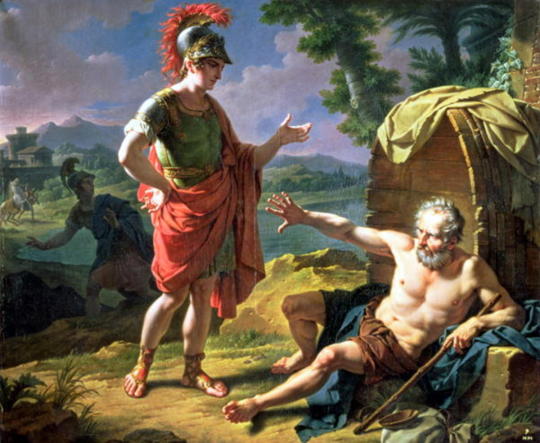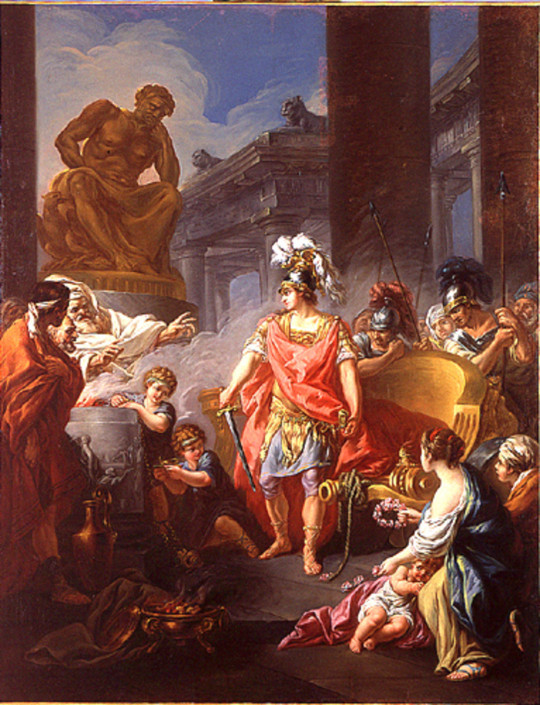#The Corinthian League
Note
Hello Dr. Reames!
Like many of us who follow you on this Hell-site we call home, I started watching Netflix's Alexander: The Making of a God. I'm an awfully shy person, and have been meaning to say hello, but a deadly concoction of anxiety and imposter syndrome has kept me away until a part of the docuseries lit a burning fire of a question.
I'm an Early Modern historian (18th century France), and although I have an obsession with Alexander the Great (going as far as begging my parents from around age 10 to 18 to legally change my name to Alexander) I never took a deep academic dive into the ancient Mediterranean world.
I think it was episode 2 where Alexander and Darius finally face each other at Issus, and after the battle Alexander has the captured "Greeks" (I can't remember now if he said Greeks or Macedonians) from Darius' army killed for fighting on the "wrong side." This kind of rubbed me the wrong way, especially when they switch to the talking heads and they kind of touch on it being known that people from the Greek poleis were mercenaries and were throughout the known Mediterranean world. That scene had a sort of 'Alexander as a Macedonian Nationalist' feel, and I assumed that Alexander was more open to the blending of cultures or at least there wasn't a single correct way to live and rule. That whole sequence of scenes felt contradictory: the mercenary system is well known yet a betrayal against "blood brothers"? Would Alexander actually have mercenaries executed for being hired by Persia?
Thank you for your time!
I'm glad you decided to finally step forward and ask a question! Nice to "meet" you.
Ah, yes, this is a matter of Real Politik.
After Granikos, a number of Greek mercenaries were captured, although their commander, Memnon, got away himself as he’d have been on horseback. Alexander had the men executed.
Greeks had served as mercenaries in Asia as far back as the Assyrian Sargonids. In fact, arguably, the archaic full hoplite panoply developed to fight on the broad plains of the middle east, not in Greece. (See John Hale’s chapter “Not Patriots, Not Farmers, Not Amateurs” in Men of Bronze, Kagan and Viggiano, eds., from Princeton; I find his argument convincing.) And, of course, Xenophon’s famous Anabasis told about the flight west of Greek mercenaries who’d served under Cyrus the Younger in his disastrous clash with his brother Artaxerxes for the throne.
For Alexander, the problem was that he—or really his father—had positioned this campaign as retribution against Persia for Persia’s earlier invasion of Greece, especially that under Xerxes. The invasion was, officially, under the aegis of the Corinthian League, with the Macedonian king just the hegemon. That made it a “Greek” campaign. This was all propaganda of course, but important for Philip, then Alexander, to maintain as it gave a patina of acceptability, not a naked power grab for more territory. While conquest wasn’t looked on then nearly as badly as it is now, it helped to have at least a plausible excuse.
His own troops included a number of Greek allies. After Chaironeia, they didn’t really have a choice. But a lot of Greeks were not happy to be in the Corinthian League. Sparta outright refused and would later be the center of an anti-Macedonian revolt.
At Granikos, the Persians had more Greek mercenaries than Alexander had Greek allies! (If one doesn’t count the Thessalian horse.) The optics were really bad. Ergo, as I think it was Carolyn who pointed out, Alexander had to send a clear message that fighting for the Persians against “the Greeks” wasn’t an option. In the Greek mind, mercenaries had always occupied a liminal status: not fully trusted because they fought for pay, but typically better than citizen troops, so used extensively post-Peloponnesian War. It was easy for Alexander to cast them as “just in it for the money” and as traitors to the Greek Cause. Like Thebes in the earlier Greco-Persian Wars, they’d “Medized,” which had a similar force to calling an American a “commie” in the 1950s.
The executions weren’t well-received in the rest of Greece, and resistance continued until it came to a head a couple years later with Agis’s Revolt (Agis III was the Spartan king who led it.). But Alexander was never afraid to send a harsh message when he needed to: Thebes, Tyre, Persepolis…. Philip did too. He could be just as brutal (Potidaia, Amphipolis, Stagiera), and Alexander learned well from him how to use carrot and stick.
So that’s what was going on there. Alexander was trying to turn Darius’ Greek mercenaries (who were some of the best troops in Asia Minor), and to send a message back HOME not to unite behind him and cut his supply lines. This was not successful; in fact, if Curtius can be believed, the Greek mercenaries were more loyal to Darius after Gaugamela than Bessus and friends. They figured they couldn’t go over to ATG, so they stuck with Darius who’d treated them well. Ironically, these same guys later did surrender after Darius’ death and were pardoned because, by then, showing clemency worked better for him than punishment.
Due to time constraints, and the desire of the showrunner to focus on Alexander and Darius, a lot of the details behind the campaign weren’t explored. So to the average reader, it looks like it was just Macedonians deciding to invade Persia because Persia killed Philip, although Philip says before he’s murdered that he wanted Alexander back for the Persian expedition. Not sure the casual viewer caught that. But this isn’t entirely wrong, as it really WAS a Macedonian campaign covered in the sheep’s skin of “Greek revenge.” Nothing is shown of ATG’s Greek campaigns, not even the infamous siege of Thebes because, again, the creators wanted it to be a clash of Macedon and Persia.
Alexander’s career is just so sprawling it’s really impossible to cover everything in limited time. But I hope that helps to contextualize why the Greek mercenaries were killed, and why it was presented as being traitors to the cause.
#asks#Alexander the Great#Alexander: the Making of a God#Greek mercenaries in Persian service#Memnon#The Corinthian League#Philip's campaign of “revenge” against Persia#Alexander's campaign of “revenge” against Persia#ancient Persia#classics#ancient macedonia
18 notes
·
View notes
Text









icons Lionel Messi de rosa.
#icons futebol#corinthians#football#futebol#icons boys#packs corinthians#brasil#icons without psd#random icons#messy icons#leo messi#messi#lionel messi#champions league#copadomundo#inter miami
95 notes
·
View notes
Text
Duda's first touches are 😙🤌
#corinthians feminino#corinthians#vic albuquerque#duda sampaio#brwnt#champions league#kaká#adidas#creators with adidas
3 notes
·
View notes
Text
Living His Word

Remember this: The one who plants few seeds will have a small harvest. But the one who plants a lot will have a big harvest. Each one of you should give what you have decided in your heart to give. You should not give if it makes you unhappy or if you feel forced to give. God loves those who are happy to give. And God can give you more blessings than you need, and you will always have plenty of everything. You will have enough to give to every good work.
— 2 Corinthians 9:6-8
The Christian church cannot sustain, maintain, and expand the Kingdom of Jesus Christ without the donations of its members and supporters. Unlike families, whose parents earn its sustenance; unlike businesses, which sell for a profit; and unlike nations, which tax its citizens; the church is dependent upon the good will of its members and supporters. This simple fact needs to be emphasized because there can be a lot of resentment about giving.
Perhaps the resentment that surrounds giving is the reason why God promises in our verses for today that those who support the efforts of the church will receive "more blessings than you need" and thus will have "plenty left over to share with others." It's hard to be a blessing when you're broke.
Furthermore, God promises here that there is proportionality at work in our giving. Like the farmer, if you plant a lot, you will have a big harvest. It could be said that God incentivizes support for the church. One does not have to fear for their financial wellbeing when giving.
As with most everything else in the Christian life, motivation and attitude are everything when it comes to giving. We shouldn't give if it makes us unhappy or if we feel forced to give. God doesn't just want our money; He wants our hearts as well.
The Prophet Malachi quotes God as saying that "Good things will come to you like rain falling from the sky" when we give (Malachi 3:10). Maybe today should be the day you find this out for yourself.
© 2016 by Bible League International
9 notes
·
View notes
Text

It’s officially October and the spooky season!! And the kicker for Kinktober!! Here is my official list for this season’s sexy and sensual season.
This series will also be posted and updated regularly (as best I can) here on the blog and on my ao3
I also have this posted on the main post too with the other masterlists.
OCTOBER 1: BODY WORSHIP/SOMNOPHILIA
OCTOBER 2: PUBLIC SEX
OCTOBER 3: DIRTY TALK/NIPPLE PLAY
OCTOBER 4: BREATHPLAY
OCTOBER 5: COCKWARMING
OCTOBER 6: COLLARING
OCTOBER 7: FEMDOM
OCTOBER 8: BONDAGE AND LINGERIE
OCTOBER 9: MIRROR SEX
OCTOBER 10: BITING/OVERSTIMULATION
OCTOBER 11: PRAISE KINK
OCTOBER 12: THIGH RIDING
OCTOBER 13: DRY HUMPING
OCTOBER 14: DENIAL/EDGING
OCTOBER 15: MUTUAL MAS
OCTOBER 16: QUICKIES
OCTOBER 17: HANDJOB
OCTOBER 18: RECIPROCATED ORAL
OCTOBER 19: BATH SEX
OCTOBER 20: AFTERCARE
OCTOBER 21: MASSAGE
OCTOBER 22: SIZE KINK
OCTOBER 23: COCK WORSHIP
OCTOBER 24: TEMPERATURE PLAY
OCTOBER 25: PEGGING
OCTOBER 26: ALIEN/BREEDING KINK
OCTOBER 27: FOOD PLAY
OCTOBER 28: FACE SITTING
OCTOBER 29: THREESOME
OCTOBER 30: CAR SEX
OCTOBER 31: EXOPHILIA
#kinktober#kinktober 2022#assassin’s creed#castlevania#marvel#dc#peaky blinders#arcane#arcane league of legends#exophilia#the arcana#the mandalorian#the book of boba fett#star wars#fanfic#dream of the endless#the sandman#the corinthian#sandman#resident evil#hades supergiant#hades game#nightwing dick Grayson#muriel the arcana#the arcana julian#the arcana asra#eternals#battinson#the batman#marvel what if
13 notes
·
View notes
Text
The Sandman, without knowing anything about it before hand, was nice but I’m feeling a little mixed about it. For me, episode 4, 5 & 6 were the strongest ones & my favorites but I don’t feel really excited about a season 2.
I love strong visuals & characters and it definitely hit those for me here and there but at the same time I feel like something is missing to make me more engaged.
It was still an enjoyable watch though & I do hope they’ll make a season 2 to expand onto this universe, characters & rules.
#special shout out to Lucienne - Lucifer - Desire - Death -#Corinthian - Gault & Hob#tv series#the sandman#Now I'm gonna watch A league of their own bc it seems like my kind of shit#and I heard it's very good !
12 notes
·
View notes
Text
Despite Sparta’s reputation for superior fighting, Spartan armies were as likely to lose battles as to win them, especially against peer opponents such as other Greek city-states. Sparta defeated Athens in the Peloponnesian War—but only by accepting Persian money to do it, reopening the door to Persian influence in the Aegean, which Greek victories at Plataea and Salamis nearly a century early had closed. Famous Spartan victories at Plataea and Mantinea were matched by consequential defeats at Pylos, Arginusae, and ultimately Leuctra. That last defeat at Leuctra, delivered by Thebes a mere 33 years after Sparta’s triumph over Athens, broke the back of Spartan power permanently, reducing Sparta to the status of a second-class power from which it never recovered.
Sparta was one of the largest Greek city-states in the classical period, yet it struggled to achieve meaningful political objectives; the result of Spartan arms abroad was mostly failure. Sparta was particularly poor at logistics; while Athens could maintain armies across the Eastern Mediterranean, Sparta repeatedly struggled to keep an army in the field even within Greece. Indeed, Sparta spent the entirety of the initial phase of the Peloponnesian War, the Archidamian War (431-421 B.C.), failing to solve the basic logistical problem of operating long term in Attica, less than 150 miles overland from Sparta and just a few days on foot from the nearest friendly major port and market, Corinth.
The Spartans were at best tactically and strategically uncreative. Tactically, Sparta employed the phalanx, a close-order shield and spear formation. But while elements of the hoplite phalanx are often presented in popular culture as uniquely Spartan, the formation and its equipment were common among the Greeks from at least the early fifth century, if not earlier. And beyond the phalanx, the Spartans were not innovators, slow to experiment with new tactics, combined arms, and naval operations. Instead, Spartan leaders consistently tried to solve their military problems with pitched hoplite battles. Spartan efforts to compel friendship by hoplite battle were particularly unsuccessful, as with the failed Spartan efforts to compel Corinth to rejoin the Spartan-led Peloponnesian League by force during the Corinthian War.
Sparta’s military mediocrity seems inexplicable given the city-state’s popular reputation as a highly militarized society, but modern scholarship has shown that this, too, is mostly a mirage. The agoge, Sparta’s rearing system for citizen boys, frequently represented in popular culture as akin to an intense military bootcamp, in fact included no arms training or military drills and was primarily designed to instill obedience and conformity rather than skill at arms or tactics. In order to instill that obedience, the older boys were encouraged to police the younger boys with violence, with the result that even in adulthood Spartan citizens were liable to settle disputes with their fists, a tendency that predictably made them poor diplomats.
But while Sparta’s military performance was merely mediocre, no better or worse than its Greek neighbors, Spartan politics makes it an exceptionally bad example for citizens or soldiers in a modern free society. Modern scholars continue to debate the degree to which ancient Sparta exercised a unique tyranny of the state over the lives of individual Spartan citizens. However, the Spartan citizenry represented only a tiny minority of people in Sparta, likely never more than 15 percent, including women of citizen status (who could not vote or hold office). Instead, the vast majority of people in Sparta, between 65 and 85 percent, were enslaved helots. (The remainder of the population was confined to Sparta’s bewildering array of noncitizen underclasses.) The figure is staggering, far higher than any other ancient Mediterranean state or, for instance, the antebellum American South, rightly termed a slave society with a third of its people enslaved.
3K notes
·
View notes
Link
#willian #corinthians #timao #fulham #futebol #football #soccer #sports #premierleague #news #noticias
0 notes
Photo

Queer TV
This is a strange time to be writing an editorial on queer representation. While the past year has seen an incredible uptick in queer stories being told with humor and heart on the small screen, 2022 has seen a record high of 238 proposed anti-LGBTQIA+ bills in the US—nearly half of them targeting trans folks. Representation is important, though, and demand for more queer stories is growing (and, to some degree, being met), with a lot of good books and comics making it to our screens. With that in mind, think of this as your selective chronological tour of all the times we won in the TV landscape of the last year (October 2021–October 2022).
Our dataset year started off with the much-awaited adaptation of Robert Jordan’s fantasy epic, Wheel of Time. With such extensive source material (15 books if you count the prequel, which is where the seeds of the sapphic storyline in Rafe Judkins’ adaptation are to be found), the viewership, generally speaking, was divided into book fans and show-only fans, and both camps shitposted and meme’d and reviewed with abandon.
The biggest queer-centric show we saw in the last year was the adaptation of @aliceoseman’s comic Heartstopper (@heartstoppercomic). Co-created by Alice Oseman themself, this adaptation was very sensitive to the much-loved source material. And, being native to Tumblr, these characters were bound to be welcomed with open arms when they hit the screen in an ebullient explosion of queer joy.
A run-down of the past year would be incomplete without the incredible queerdos of the Revenge who swashbuckled their way into our hearts. We’re referring, of course, to Our Flag Means Death’s Gentleman Pirate and his merry band of (living-wage-paid, no less!) shipmates. Your favorites included genderqueer Jim ‘not-a-fucking-mermaid’ Jimenez and Oluwande, Lucius Sprigg and Black Peter, Frenchie who just hates cats, and The Swede, who keeps his heart but loses his teeth. Then, of course, we have Blackbeard himself, or simply Ed, who is struggling with his identity (villain or softboi).
Based on the story by @veschwab and produced by @belletristbooks, First Kill was another adaptation that fans of vampire stories got very excited about. Add to that the fact that this was very much a sapphic enemies-to-lovers scenario between hunter Calliope and young vampire Juliette, and the pre-show excitement was palpable. The post-season disappointment even more so as fans turned to their dashes to vent about the lack of good lesbian and wlw representation in 2022’s TV landscape.
Where the cancelation of First Kill left us reeling, the Rockford Peaches from A League of Our Own came in clutch and soothed our sapphic souls. You love the show which you affectionately shortened, in good old Tumblr fashion, to a silly little acronym: aloto. Whether you’re in it for the gal pal aesthetics, the butch energy, or Uncle Bert, or some good old fashioned baller drama, there truly was something for all of your wlw whimsies here. Let’s go, Peaches!
@neilgaiman’s The Sandman series finally came out to much acclaim, and came out so gay that armchair reviewers of the homophobic sort really struggled to wrap their minds around quite how gay it is. We got pansexual serial killing Corinthian! Pansexual, demon-hunting, women-kissing Johanna Constantine! Some very loaded moments between Morpheus and Hob Gadlin! This is what dreams are made of (sort of)!
This whole list would be nothing, nada, a crumb of zilch whizzing around a black hole, if it weren’t for the writers who created many of these stories in the first place. So thank you to them. And to you, Tumblr, for celebrating the good and standing up for each other through another year. Here’s to a kinder 2023.
4K notes
·
View notes
Note
Ok so you know how the comics take place in the same universe as the justice league and all those guys? And you know how in the comic of 24/7 there's some local, small town superhero on TV, suggesting that any random loser can be a superhero? Do you see where I'm going with this?
Superhob: mild-mannered professor by day, scourge of London's criminal underworld by night. Calls himself The Immortal, doesn't appear to have any superpowers but fights with all kinds of old-timey weapons like maces and crossbows and stuff. He's been shot and stabbed and blown up and all kinds of things that really should have killed him, but he just keeps coming back. Probably has an ongoing rivalry/sexual tension with Johanna.
Could be a fishbowl rescue, and/or maybe he manages to catch the Corinthian? Or like, he somehow manages to cross paths with Dream shortly after he gets out of the fishbowl and they just do the Spiderman pointing meme at each other. Idk, I didn't have any particular plot in mind but I feel like there's a lot of potential there...
-🍓
This is such a great idea!!! Especially with the whole plot with The Sandman becoming a superhero through Jed's dreams (in the show)
I like the idea of a fishbowl rescue - Hob’s been hearing these rumours about fawney rigg for years, and one day he just happens to be in the area. He figures he'll take a look, since he's already in costume/fully equipped with weapons. Turns out he only has to bonk an old man over the head with the butt of his sword, so it's not very complicated to infiltrate the Manor. But what he finds in the basement in a lot more complicated, that's for sure.
He gets Dream out of the glass, glad that he's got such array of pointy, heavy medieval weapons. He can't get over the fact that he's just rescued his stranger. His stranger apparently can't get over the fact that Hob is trying to be a superhero (Hob resents the word trying - he's a very good superhero thanks very much).
Dream is like "Well thanks very much but now I have to find all my stuff" and Hob is like "cool! I'll help!" So superhob and the sandman join forces, to look for the sand (Hob has a pretty good idea that Jo had some weird magic pouch at one point). Maybe along the way they discuss the whole 1889 misunderstanding. Dream admits that maybe they are friends now. Even if Hob’s superhero identity is kind of cringe.
I quite like the idea of Dream going to hell (and refusing to let Hob come), so while he's gone Hob goes and looks for the Corinthian and a lot of stabbing goes down, but ultimately Hob captures Cori and when Dream comes back, he finds his rogue nightmare bound up with ancient magic while Hob sits on his chest and smiles smugly.
Maybe Superhob is a little more competent than Dream was willing to admit...
63 notes
·
View notes
Text

Marble bust of the great Athenian general, orator, and statesman Pericles (ca. 495-429 BCE), shown here wearing a Corinthian helmet. Pericles is credited by many historians, notably Thucydides, with guiding 5th century BCE Athens to its peak of greatness; among his achievements were the ambitious building program on the Parthenon and the conversion of the Delian League, originally formed to combat the Persians, into a tribute-paying Athenian empire. His reputation was not, however, unblemished. His political opponents accused him of aiming at tyranny, while his enforcement of the Megarian Decree--which barred Sparta's ally Megara from all Athenian harbors and was effectively an act of economic warfare--may have been the proximate cause of the Peloponnesian War. His death from plague plunged Athens into crisis and led to a succession of populist leaders such as Cleon and Hyperbolus, whose far more aggressive foreign policy ultimately proved disastrous for Athens. Though the city would survive and even make a second attempt at empire-building, it never regained the unchallenged supremacy it had enjoyed in the Periclean period.
Roman copy of uncertain date after a lost Greek original. Now in the Museo Chiaramonti, Vatican City.
#classics#tagamemnon#Ancient Greece#Classical Greece#ancient history#Greek history#Ancient Greek history#Pericles#Perikles#art#art history#ancient art#Greek art#Ancient Greek art#Classical Greek art#sculpture#portrait sculpture#portrait bust#marble#stonework#carving#Museo Chiaramonti#Vatican Museums
191 notes
·
View notes
Note
headers do szoboszlai do Liverpool pfv
headers szoboszlai.








#icons futebol#football#futebol#icons boys#brasil#icons without psd#random icons#messy icons#packs corinthians#corinthians#liverpool#liverpool fc#inglaterra#england#dominik szoboszlai#premier league#chelsea#arsenal#manchester united#man united#mohamed salah#neymar#leo messi#messi#champions league#real madrid#fc barcelona#judebelligham#jude bellingham#pablo gavi
27 notes
·
View notes
Text
Living His Word

He made Him who knew no sin to be sin for us, that we might become the righteousness of God in Him.
— 2 Corinthians 5:21
Did you know that those who are in Christ Jesus are righteous? The Apostle Paul says that we are "the righteousness of God." Some may have a problem accepting this, because they are well aware of the sin that remains in their lives. Nevertheless, from God's perspective they too are righteous.
The reason for this is that our acceptance of Jesus as Lord and Savior effectuated an exchange. He became sin for us, while we became His righteousness. The greatest deal there ever has been or ever will be. Although Jesus led a perfectly righteous life, He paid the penalty for our sin by suffering and dying on the cross. In contrast, we are defiled and depraved, but in Him we are treated as the very righteousness of God.
To be righteous means to be blameless before God's moral standards. To be wicked, of course, means the exact opposite. Due to our wickedness, there was no hope of us ever achieving on our own the standing of righteousness before God. The standards are too high and we are too low. The good news is that righteousness is possible for us through our acceptance of what Jesus did on the cross. As a result, one day we will stand before God and He will not see our wickedness, but only Christ's perfection.
It is important that we accept this truth. Failure to fully accept it implicitly implies that somehow we must achieve a righteousness of our own. It is also important for our own well-being. Thinking we must somehow live up to a standard we can't live up to is a heavy burden to bear. It is also important for our relationships to others. Expecting others to live up to unachievable standards can lead us into judgmental attitudes toward them.
Let the peace and comfort that comes from the acceptance of this biblical teaching sink deep into your soul. Let it define you, for you truly are the righteousness of God in Christ Jesus.
© 2016 by Bible League International
6 notes
·
View notes
Text



He was King of Macedon, King of Persia, King of Kings, Pharaoh of the Upper and Lower Egypt, Hegemon of the Corinthian League, High Priest of Marduk and Ishtar, the greek king who would conquer Persia as written in the Old Testment, Son of Ámon-Zeus, Achilles Reborn, the Reincarnation of Hórus, Lord of Asia. He was Alexander the Great!!
One fine day after returning to Macedon, Alexander was visiting the state. He saw Diogenes, an old man a philosopher laying down in a barrel. He was taking sun bath. Alexander was told that Diogenes was a stupid and foolish man with no sanity.
When Alexander came close to him Diogenes didn't get up, instead he shouted grumpily " For the sake of God just leave me and my sun alone".
Alexander's subordinates hasted to refrain Diogenes further words. They screamed"Do you not see? It is I, Alexander the Great, the emperor, unraveling in the tapestry of my own existence. But Diogenes as he was he didn't care, he argued directly to Alexander grumping " if i mix your father's bone with a slave's would you tell me which belongs to you!?"
Alexander was a wise man, he glared at the man and smiled, he ended up asking Diogenes " do you mind if I lay next to you!?" To which Diogenes said " Do whatever you want i don't care".
Alexander laying beside Diogenes said, "you know if i wasn't the emperor, i would be Diogenes"
#alexander the great#alexander the making of a god#the song of achilles#history#diogenes#magnifestamagnetica#virginia woolf#anecdotes
20 notes
·
View notes
Text
Morpheus
Morpheus x male!reader
Summary: The Corinthian finds Morpheus's lover. Morpheus is not happy.
Morpheus x male!reader
Summary: Morpheus's lover gets sick and Morpheus take care of him.
Morpheus x male!reader
Summary: Morpheus hasn't heard from his lover in a few days. At first he thinks (Y/N) is busy, but soon realizes that somebody took him. Morpheus is not happy.
Morpheus x male!reader
Summary: (Y/N) is not feeling good about himself. He feels insecure about his relationship with Morpheus, thinking that he was out of Morpheus's league. The result of those thoughts was putting distance and Morpheus is determined to find out what is (Y/N) doing.
39 notes
·
View notes
Note
Dr. Reames!! Oftentimes I see it mentioned that Alexander’s Persian campaign was framed at the time as a revenge against Persia for previous wars against Greece. And so, for example, the burning of Persepolis could be interpreted as payback for the burning of Athens.
But how accurate is that actually? I can only suppose that the top echelons of the Macedonian military establishment didn’t really feel that strongly about Greece as a whole (as Greece wasn’t a unified country like today), but had to frame it as such to disguise what could be seen as a shameless offensive land grab.
Even so, Alexander knew his propaganda. Was there a general feeling among the people of Greece and the rank and file troops that this campaign was a revenge for the previous wars Persia waged against Greece? Some sort of unifying spirit, ideal? And Alexander exploited this for his benefit? Or is this idea of a Greece vs Persia conflict a complete fabrication of misinterpretation?
The idea of a “Revenge against Persia” campaign was part of 4th century political discourse before Alexander, or even Philip. The question was who would lead such a campaign? Naturally, Athens thought they should, but after their defeat in the Peloponnesian War, didn’t have the military mojo. And even if Sparta had opposed the Persian invasion (alongside Athens), she owed her success in the Pel War to Persian assistance, so that was a problem. Thebes as a potential leader was even worse, as she’d Medized (went over to the Persians), so hell-to-the-no would she be appropriate.
Isokrates was probably the first to suggest it be Philip, as his star was rising. Yes, Macedon had also Medized, but Alexander I had been a clever man who played both sides against the middle and was able to burnish his rep after the war as “having no choice, and see? I helped Athens by providing her with timber for the Greek fleet”…if at, we’re sure, a substantial sum that benefited Maceon. But Macedon resented Persia too and had been a victim! It provided the plausible deniability needed to elevate Philip as leader of the Go-and-get-Persia campaign.
Of course Athens was not keen on this. She still thought SHE should be leading the vengeance war, as she won the two most significant battles of the Greco-Persian Wars (Marathon in #1 and Salamis in #2). That Philip was out-maneuvering her at every turn for the hegemony of greater Greece was additionally galling.
When Philip decided to invade Persia is a point of great contention, but I think he had it in mind by the time of his extensive Balkan campaign (c. 341/40/39. when Alexander was left in Pella as regent). Much of that was to secure the Black Sea coast and conquer Perinthos and Byzantion (Athenian allies) in order to secure a bridgehead to Asia. He may have believed that the Athenian Isokrates’s oration letter to him was indicative that Athens could be won over as an ally, in order to provide the ships he needed but didn’t have. He knew Demosthenes a problem, but may not have believed fear of/resentment against Philip himself would unite Thebes and Athens (inveterate enemies) to oppose him at Chaironeia.
But that’s how it went. Philip won anyway and created the Corinthian League, whose purpose was the invasion of Persia and vengeance for the earlier Persian invasion of Greece. Was that Philip’s primary motivation? Oh, hell no. He wanted the MONEY/loot (and glory). But a campaign of retribution put a better face on it, and justified his usurpation of the Athenian navy, which he absolutely had to have to be successful.
When Philip was assassinated, Alexander simply took up where his father left off. He literally told the Corinthian League (when he reconvened them not long after Philip’s death), “Only the name of the king has changed….”
So yes, the propaganda wasn’t invented by Alexander, or even by Philip, but they used it to very good effect, as it allowed them to demand allies (and BOATS). Alexander didn’t dissolve the alliance and release those troops until after Darius’s death. And even then, he offered good pay to stay on with the rest of his conquests (which many did).
#asks#philip ii of macedon#Philip of Macedon#Alexander the Great#ancient Macedonia#Greco-Persian Wars#Alexander's campaigns#Isokrates#Isocrates#ancient Athens#Greek revenge campaign against Persia#Classics
10 notes
·
View notes